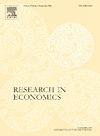Discrimination in access to sports associations: the effects of gender, origin and income
IF 1.2
Q3 ECONOMICS
引用次数: 0
Abstract
This study employs the correspondence test method to investigate discrimination in access to sports clubs in France. This involves sending requests for information to sports clubs. Eight fictitious candidate profiles were created to assess three discrimination criteria: gender, ethnic origin, and income level. The profiles sent emails to 1,200 sports clubs, requesting information on access to training for four different sports, chosen for their highly gendered practices. The results demonstrate the absence of quantitative discrimination in three of the four sports tested. Nevertheless, there is a considerable disadvantage for the three criteria in horseback riding, a sport with considerably higher practice costs than the other disciplines under investigation. Furthermore, the content of the emails received suggests a preference for the reference candidate over the North African and opposite-sex candidates.
参加体育协会的歧视:性别、出身和收入的影响
本研究采用对应检验方法对法国体育俱乐部准入歧视进行调查。这包括向体育俱乐部发送信息请求。创建了8个虚构的候选人档案来评估三个歧视标准:性别、种族血统和收入水平。这些档案向1200家体育俱乐部发送了电子邮件,要求提供四种不同体育项目的培训信息,这些项目是根据高度性别化的项目选择的。结果表明,在四个测试的运动中,有三个没有定量歧视。然而,这三项标准在骑马方面存在相当大的劣势,因为这项运动的练习成本比其他被调查的项目要高得多。此外,收到的电子邮件内容表明,与北非和异性候选人相比,他们更喜欢参考候选人。
本文章由计算机程序翻译,如有差异,请以英文原文为准。
求助全文
约1分钟内获得全文
求助全文
来源期刊

Research in Economics
ECONOMICS-
CiteScore
1.40
自引率
0.00%
发文量
37
审稿时长
89 days
期刊介绍:
Established in 1947, Research in Economics is one of the oldest general-interest economics journals in the world and the main one among those based in Italy. The purpose of the journal is to select original theoretical and empirical articles that will have high impact on the debate in the social sciences; since 1947, it has published important research contributions on a wide range of topics. A summary of our editorial policy is this: the editors make a preliminary assessment of whether the results of a paper, if correct, are worth publishing. If so one of the associate editors reviews the paper: from the reviewer we expect to learn if the paper is understandable and coherent and - within reasonable bounds - the results are correct. We believe that long lags in publication and multiple demands for revision simply slow scientific progress. Our goal is to provide you a definitive answer within one month of submission. We give the editors one week to judge the overall contribution and if acceptable send your paper to an associate editor. We expect the associate editor to provide a more detailed evaluation within three weeks so that the editors can make a final decision before the month expires. In the (rare) case of a revision we allow four months and in the case of conditional acceptance we allow two months to submit the final version. In both cases we expect a cover letter explaining how you met the requirements. For conditional acceptance the editors will verify that the requirements were met. In the case of revision the original associate editor will do so. If the revision cannot be at least conditionally accepted it is rejected: there is no second revision.
 求助内容:
求助内容: 应助结果提醒方式:
应助结果提醒方式:


